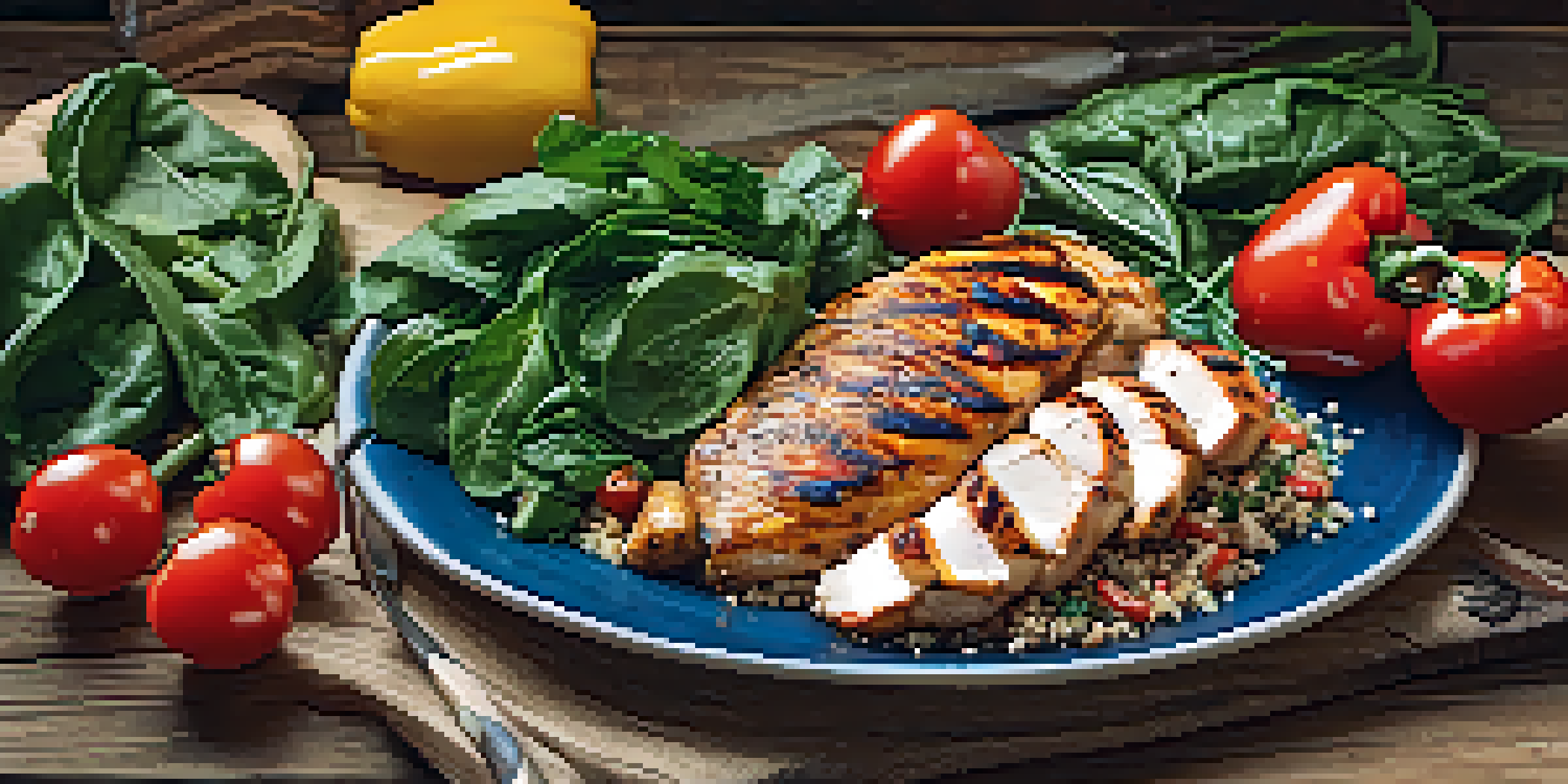Nutrition Strategies for Recovery After Intense Training

Understanding the Importance of Post-Workout Nutrition
After an intense training session, your body is in recovery mode, which means it needs the right nutrients to heal and rebuild. This is where post-workout nutrition comes into play. Without proper nutrition, the recovery process can be significantly hindered, leading to fatigue and decreased performance in future workouts.
Nutrition is not only what you eat, but also what you absorb and what you can utilize for your health and fitness goals.
Think of your body as a car; just like you wouldn't drive a car on empty, you shouldn't skip refueling your muscles after a workout. Nutrients help repair muscle fibers, replenish glycogen stores, and reduce inflammation. All of these factors are crucial for getting back on track and hitting your fitness goals.
By prioritizing nutrition after your training, you can enhance your recovery and prepare your body for the next challenge. Let's dive deeper into what specific nutrients you should focus on to maximize your recovery.
The Role of Protein in Muscle Recovery
Protein is often hailed as the superstar of post-workout nutrition, and for good reason. Consuming protein after exercise helps repair and build muscle tissue, which is essential after intense workouts. Aim for about 20-30 grams of high-quality protein to kickstart the recovery process.

Consider sources like lean meats, dairy, or plant-based options such as legumes and tofu. The amino acids in protein act like building blocks, repairing the microscopic tears that occur in your muscles during exercise. This is why it's crucial to consume protein soon after your workout – your muscles are eager to absorb those nutrients.
Post-Workout Nutrition is Essential
Proper nutrition after exercise helps your body recover, repair muscle, and prepare for future workouts.
Incorporating protein into your post-workout meal or snack can significantly enhance your recovery, ensuring you feel refreshed and ready for your next training session.
Carbohydrates: Replenishing Your Energy Stores
After a hard workout, your body’s glycogen stores are often depleted, and that’s where carbohydrates come in. Carbs are your body’s primary source of energy, and replenishing them is key to effective recovery. Aim for a combination of simple and complex carbohydrates post-workout for optimal results.
The body achieves what the mind believes, and proper nutrition fuels that belief.
Simple carbs, like fruits or honey, can provide a quick energy boost, while complex carbs, such as whole grains or sweet potatoes, offer sustained energy. By refueling with carbohydrates, you’ll not only recover faster but also improve your performance in future workouts.
Remember, balancing your intake of protein and carbohydrates after exercise can be a game-changer. It’s all about giving your body the fuel it desperately needs to bounce back.
Hydration: The Overlooked Recovery Essential
While we often focus on food, hydration is just as crucial for recovery after intense training. Dehydration can lead to fatigue, decreased performance, and longer recovery times. So, make sure to hydrate before, during, and after your workout to maintain optimal performance and recovery.
Water is great, but sometimes you need to replenish electrolytes lost through sweat, particularly after heavy training. Sports drinks or electrolyte-rich foods like bananas can help restore balance. Listening to your body’s signals is vital; if you're feeling thirsty, it's a sign you need to drink up.
Protein and Carbs Boost Recovery
Consuming a mix of protein and carbohydrates post-workout replenishes energy stores and supports muscle repair.
Incorporating hydration into your recovery strategy ensures that your body can efficiently carry out its recovery processes. It’s a simple yet effective way to enhance your overall recovery routine.
Timing: When to Eat for Maximum Recovery
Eating the right foods at the right time can significantly impact your recovery. The window of opportunity for optimal recovery often lies within 30 to 60 minutes post-workout. During this period, your muscles are primed to absorb nutrients, making it an ideal time for a recovery meal or snack.
If you can, plan ahead and have a post-workout snack ready to go. This could be a protein shake, a yogurt with fruit, or a turkey sandwich. The goal is to provide your body with the nutrients it needs without making you feel sluggish.
By paying attention to the timing of your meals, you can give your body the best chance to recover efficiently and effectively.
Healthy Fats: Supporting Recovery and Inflammation Management
While protein and carbohydrates often steal the spotlight, healthy fats play a significant role in recovery, too. Fats are essential for hormone production and can help reduce inflammation, which is crucial after intense workouts. Incorporating sources of healthy fats, like avocados, nuts, and olive oil, can support your overall recovery strategy.
Fat may not be the first thing that comes to mind when you think of recovery, but it can help keep your body functioning optimally. Plus, it can provide a slow and steady source of energy that can be beneficial in the days following your workouts.
Hydration Aids Recovery Process
Staying hydrated is crucial for recovery, as it prevents fatigue and supports overall bodily functions after intense training.
Incorporating healthy fats into your recovery meals ensures that you’re not only refueling your body but also supporting long-term health.
The Role of Micronutrients in Recovery
While macronutrients like protein, carbs, and fats are vital for recovery, we shouldn’t overlook the importance of micronutrients. Vitamins and minerals play a critical role in various bodily functions, including muscle recovery and immune support. Foods rich in antioxidants, like berries and leafy greens, can help combat oxidative stress caused by intense training.
Incorporating a variety of colorful fruits and vegetables into your diet ensures you're getting a broad spectrum of nutrients. This can aid in faster recovery and overall health. Think of it as giving your body the tools it needs to rebuild and recover efficiently.

By focusing on both macronutrients and micronutrients, you can create a well-rounded recovery plan that supports your fitness journey.
Creating a Personalized Recovery Nutrition Plan
Now that we've explored various nutrition strategies for recovery, it’s time to create a plan that works for you. Everyone's body is different, and factors like age, gender, body type, and training intensity can influence your nutritional needs. Start by assessing your own training routine and recovery goals.
Consider keeping a food diary to track what you eat post-workout and how you feel afterward. This can help you identify patterns and make adjustments as needed. It’s all about finding the right balance that supports your unique body and lifestyle.
Creating a personalized recovery nutrition plan can be a game-changer in achieving your fitness goals. Remember, it’s about supporting your body’s recovery process so you can continue to challenge yourself and grow stronger.